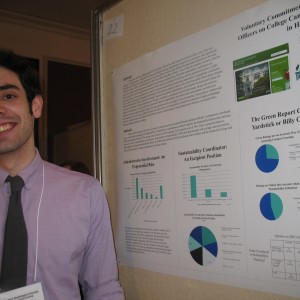Anthropology and Sociology Honors Thesis
Departmental Honors
Under the guidance of an A&S faculty member, an A&S major writes a thesis based on an approved project in a specialized field of anthropology or sociology.
Timetable for Pursuit of Honors
Junior Year
Spring semester (typically in March, before registration for fall courses): Students interested in doing an honors thesis should meet with a potential faculty advisor. At this point, students do not need to have a firm thesis topic or research question, but they need to consult with an A&S faculty member at this time to explore the possibility of doing a thesis, learn more about the thesis process, and begin to solidify a plan of action should they choose to complete a thesis.
April: Students register via a drop/add form for A&S 495.
April and May: Students continue to meet with their faculty advisor to solidify a thesis topic and determine a research plan. If a student is planning on collecting data from human subjects over the summer before their senior year as part of their senior honors thesis, they should submit a proposal to Lafayette’s IRB by May 1st for review (note: there are some types of projects with human subjects that do not require IRB review, but students should discuss this with their faculty advisor).
Summer following Junior Year
Students often begin collecting their thesis data and reading literature related to their topics.
Senior Year
Fall semester: Students who are collecting data from human subjects and who did not yet receive IRB approval should submit their proposal to IRB.
Fall semester: Students meet regularly with their thesis supervisor. They also should begin to comprise the rest of their thesis committee—each A&S thesis has an A&S faculty member as chair of the thesis, a second reader who is also an A&S faculty member, and an outside reader who is a Lafayette faculty member in a non-A&S department or program.
November-December: The thesis advisor and student discuss the progress of the thesis and whether it will continue into the spring semester. If they decide at this point (or within the first few weeks of the spring semester) that the thesis will not continue, the first semester’s work converts to an independent study. If they decide to proceed, the student registers for A&S 496 for the spring semester.
February semester: Final decisions regarding whether the thesis will continue are due. According to Lafayette policy, after the first semester, the faculty thesis supervisor may nominate a student who has earned an “A” in the thesis or research course for departmental honors. These nominations are due before the end of the third full week of classes in the second semester of work.
Spring semester: Students meet regularly with their thesis supervisor and continue to develop their thesis.
Early April: Students should aim to have a complete first draft of their thesis completed. Depending on the preferences of the student’s thesis committee, the student will share drafts of the thesis with their entire committee.
Late April: Students will have a “final” version of their thesis to share with their full thesis committee.
First two weeks of May: The thesis defense occurs. In the defense, the student presents their thesis to their committee and any other interested parties and then answers questions on it and the related field(s).
To be awarded honors in A&S, the student must a) complete all thesis requirements by the end of the final exam period and b) graduate with an overall GPA of 3.00 or greater and a GPA in A&S of 3.20 or greater.
Joint Honors Thesis
Students may pursue a joint honors thesis in Anthropology and Sociology and another major/program. Students who pursue joint honors enroll in the honors thesis course in Anthropology and Sociology (A&S 495 or 496) one semester and the honors thesis course for the second major/program for the second semester. Students doing a joint honors thesis have thesis advisors in both departments/programs. Students interested in pursuing a joint honors thesis should attend to the same timetable as those doing A&S theses.



